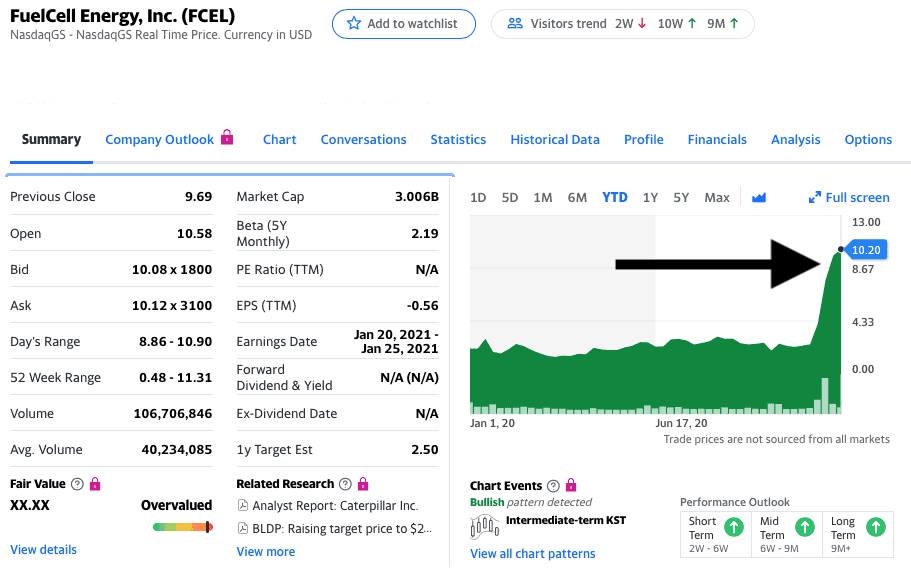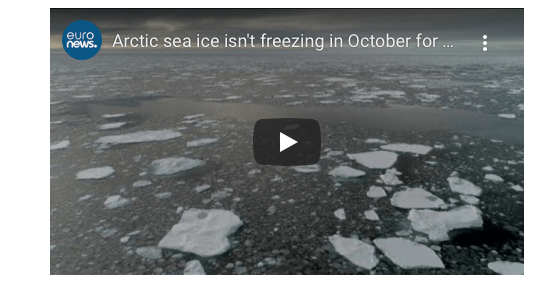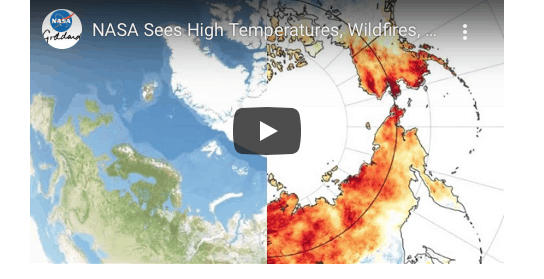I have been discussing various renewable energy stocks related to climate change in both my monthly CLIMATELLIGENCE newsletter and bi-weekly WeatherWealth service to investors and farmers from all corners of the earth. One such stock I recently recommended what FUEL CELL (NASDAQ: FCEL), which is up more than 300% over the last few months. FCEL is a carbon capture company, which has recently seen huge investments from companies such as EXXON-MOBIL (XOM) and Pfizer (PFE)


Click above for more information
Here is an article recently published by the boutique Sarasota, Florida investment firm Cumberland Advisors. For more information, you can go to their web site.
What the new Biden Administration will due with respect to energy policy
We expect the new Biden administration to reverse on a massive scale Trump’s deregulation of energy and to turn strongly to sustainable-energy policy. The implications for investing in ESG are huge. Cumberland holds positions in wind, solar and water and we expect to hold those positions for a long cycle of growth. Markets are already moving to reprice this dramatic shift in policy. Anyone wishing to discuss the ESG approach at Cumberland in stocks or in bonds can email me, and I will pass the message on to the right person for discussion. Cumberland has a new as of this year, Pandemic-Affected Municipal Bond Strategy (PAMS). If you have an interest, contact us for more information about this strategy.
Here’s what’s happening in the Biden transition team on the climate agenda, from Wednesday’s edition of POLITICO Playbook:
“TRANSITION DEETS … WAPO’S MATT VISER: At the Environmental Protection Agency, acting deputy chief of staff Wes Carpenter met with the transition team’s point person, Patrice Simms. When it comes to the environment, the transition from Trump to Biden is likely to involve a dizzying effort to halt the deregulatory zeal of the past four years and to reestablish the United States as a global force for tackling climate change.
“At the Department of Justice – where some officials were privately frustrated at being unable to work with Biden’s team sooner – Lee Lofthus, the assistant attorney general for administration, was tapped to work with Biden’s agency team, led by Christopher H. Schroeder, a former Justice Department official now at Duke Law School, according to a Justice Department official.
“At the National Oceanic and Atmospheric Administration, the agency’s transition team was scheduled to hold an initial call with the Biden administration’s review committee Tuesday afternoon. NOAA leadership has prepared ‘extensive’ briefing materials on agency operations, a senior NOAA official said. Officials at the Department of Housing and Urban Development, who had previously ordered civil servants not to talk to Biden’s transition team, were scheduling meetings Tuesday and putting together a briefing book.”
(“POLITICO Playbook: Some good news ahead of Thanksgiving,” https://www.politico.com/newsletters/playbook/2020/11/25/some-good-news-ahead-of-thanksgiving-490992)
Here’s a detailed reference in the wealth management area with regard to these changes. There is a lot to absorb here, and it is well worth the time to read it.
“Will Biden Take Action on ESG Regulation?” https://www.wealthmanagement.com/regulation-compliance/will-biden-take-action-esg-regulation
Let me move to the outgoing Trump administration’s trying to make a final policy stand. We believe that any actions taken by Trump’s anti-climate colleagues will be attacked and reversed immediately when the Biden administration takes office. That means the prices that are sought by Trump’s friends and colleagues are negatively impacted right now. We expect any leasing rights they may sell will be marked down by bidders. Think about it. Would you buy something when you are headed into a massive headwind against the business model you are trying to achieve?
Let’s move north of the Arctic Circle.
As a departing action, the Trump administration is moving quickly to open up an additional 1.6 million acres of Alaska’s Arctic National Wildlife Refuge (ANWR) to oil and gas development. Doing so when there is a huge supply overhang in oil and natural gas is a questionable move. The effort to sell the drilling rights before Biden takes office is well underway, but there is pushback in the form of lawsuits filed by Native Alaskan tribes and a coalition of 15 US states.
At stake are an estimated 7.7 billion barrels of oil under the ANWR coastal plain, versus what Margorie Gemmill, First Chief of the Native Village of Venetie Tribal Government, calls “one of the most important natural, cultural, and subsistence resources to the Neets’ąįį Gwich’in of Arctic Village and Venetie and to the Gwich’in people as a whole.” She affirms, “As tribal governments, we will defend the rights of our people at all costs.”
According to Fox News,
“Despite the region being opened for drilling, it is unclear if there is a willingness on the part of companies to wade into the area amid questions about the future demand for oil and vows from large banks not to invest in the region. Several major banks, including Wells Fargo & Co. and Morgan Stanley, have announced in recent months they will pull back from supporting oil and gas projects in the refuge.”
(“Two lawsuits filed against Trump’s plan to open oil and gas drilling in Alaska’s Arctic refuge,”https://www.foxnews.com/politics/two-lawsuits-trump-oil-gas-drilling-alaskas-arctic-refuge)
Following up on the situation in the Arctic, we turn to meteorologist Jim Roemer, who has a new newsletter called Climatelligence. Here’s a link to get a sample: https://www.bestweatherinc.com/free-winter-report/. Jim focuses on commodity trading and weather-related drivers. He also provided two links from Climatelligence for us to share with readers.
The first one is a news report from Euronews on the failure of Arctic sea ice to form this October: “Arctic sea ice isn’t freezing in October for the first time on record,” https://www.youtube.com/watch?v=G1gXS9QYlQA&feature=youtu.be. You wouldn’t normally encounter this report in the US.

The second link is to a NASA report on what satellites have revealed about warming in the Arctic: “NASA Sees High Temperatures, Wildfires, Sea Ice Minimum Extent in Warming Arctic,” https://www.youtube.com/watch?v=vtM9KTVGFVw.

Federal Reserve and financial stability with respect to climate change
At the intersection of climate change and the financial sector, here’s the Fed’s new 80-page study on financial stability: https://www.federalreserve.gov/publications/files/financial-stability-report-20201109.pdf. I recommend that every serious investor read it. Let me get to an excerpt on climate change. That section starts on page 58:
“Staff members throughout the Federal Reserve System continue to research the relationships among climate risks and economic and financial risks and, ultimately, to better identify the transmission channels through which climate risks could affect the financial sector. This work is conducted in close consultation with other U.S. agencies and international groups in an effort to strengthen the knowledge and understanding of this growing economic and financial stability issue.
“The Federal Reserve is evaluating and investing in ways to deepen its understanding of the full scope of implications of climate change for markets, financial exposures, and interconnections between markets and financial institutions. It will monitor and assess the financial system for vulnerabilities related to climate change through its financial stability framework. Moreover, Federal Reserve supervisors expect banks to have systems in place that appropriately identify, measure, control, and monitor all of their material risks, which for many banks are likely to extend to climate risks.”
In addition, the Chicago Fed has just published “A New Framework for Assessing Climate Change Risk in Financial Markets,” available at https://www.chicagofed.org/publications/chicago-fed-letter/2020/448.
The Brookings Institution community has weighed in with possible priorities the Biden administration might undertake: “Around the halls: What should the Biden administration prioritize in its climate policy?” https://www.brookings.edu/blog/planetpolicy/2020/11/23/around-the-halls-what-should-the-biden-administration-prioritize-in-its-climate-policy/.
And the WSJ takes a look at why investors are turning to wind and solar as costs have become competitive and investments offer returns comparable to those offered by utilities: “Why Investors Have Learned to Love Wind and Solar Power,” https://www.wsj.com/articles/why-investors-have-learned-to-love-wind-and-solar-power-11594027941
The new Sarasota, Florida Climate Adaptation Center
We also want to link again to the Climate Adaptation Center (CAC). Last week we published CEO Bob Bunting’s guest commentary on hurricane intensification and the CAC’s effort to implement adaptive strategies to counter growing climate-change impacts. The CAC’s immediate work focuses on Florida-specific issues, including hurricanes, red tide, and rising sea levels; but CAC is very sensitive to the arctic. A CAC board member, Bob Corell, has presented on Arctic melting here in Sarasota (https://youtu.be/BfHaMBXr718). In Florida, climate change is a big issue and a $7 trillion coastline facing a rising sea level is on everyone’s mind. CAC is a free sign-up, here: https://www.theclimateadaptationcenter.org/about-us/contact-us/.
Some final thoughts
While we are celebrating Thanksgiving and trying to be socially distant and wearing masks and caring about the health and safety of our families and friends and neighbors, perhaps this is a good, quiet time to contemplate global climate-change issues and what we can do about them.
At Cumberland we continue to overweight the solar, wind, and water sectors in our US ETF investment portfolios. We believe that events are already on a course that will eventually force more and more changes in behavior as the climate changes shock not only our private- and public-sector institutions but each of us personally.
The policy issues are in the hands of the next US administration and Congress. Climate adaptation is underway around the world, although the pace is slow and the climate doesn’t wait for governments to catch up. Right now, it is COVID that is at the top of everyone’s agenda, but while we wait for vaccine approval and distribution, the climate keeps changing; the globe keeps warming; sea levels keep rising.
We will end with an offering from economist friend Derek Riley, a long-time friend. During a combined European/American economists’ meeting in China, I recall standing with Derek in Shanghai and looking across the river at the spectacular space-age Shanghai cityscape. He described how what we were looking at was originally an oil refinery site. Derek had a long history with Elf Aquitaine. We talked about what it would mean if China committed to a climate change agenda, if the Chinese tired of unbreathable air in Beijing, if the poisoning of the country’s water were to stop, and whether a clean-up would reverse the damage. Derek said, “Here in China they can do whatever they decide to do. Notice that you don’t see a refinery complex here anymore.” For Derek’s bio, see this public link: https://conference-board.org/bio/index.cfm?bioid=469.
Here’s the amusing anecdote that Derek sent about this “green thing” and the generation gap. Happy Sunday.
David R. Kotok
Chairman of the Board & Chief Investment Officer












